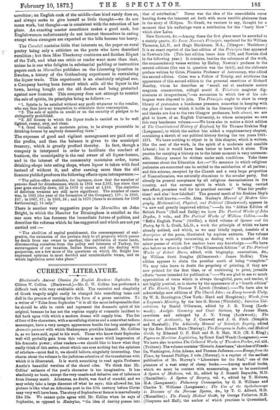CURRENT LITERATURE.
Blacicwood's Ancient Classics for English Readers : Sophocles. By Clifton W. Collins. (Blackwood.)—Mr. C. W. Collins has performed a difficult task with very creditable skill. The restraint and simplicity of Greek tragedy might easily be changed into something tame and dull in the process of turning into the form of a prose narrative. To a writer of " Tales from Sophocles " it is all the more indispensable that he should be able to catch and represent the dramatic spirit of his original, because he has not the copious supply of romantic incident to fall back upon with which a modern drama will supply him. The list of four of five characters, with a moralizing chorus and a somewhat tedious messenger, have a very meagre appearance beside the long catalogue of dramatis persona: with which Shakespeare provides himself. Mr. Collins is, as we have said, equal to his work. Those who know their Sophocles well will probably gain from this volume a more vivid impression of his dramatic power ; other readers—we should like to know what they really think of this series, about which one sees nothing but the opinions of scholars—must find it, we should believe, singularly interesting. One charm about the volume is the judicious selection of the translations with which it is illustrated. It is worth something to read again Professor Austin's beautiful versions of the choral odes. We think that Mr. Collins' estimate of the poet's character is too imaginative. It has absolutely no basis, except the very unsafe and delusive one of inference from literary merit. Athensetts, no doubt, was fond of scandal, and we may safely take a large discount off what he says; this allowed for, his picture is like what en Athenian poet in the fifth century before Christ may very well have been. The story of Sophocles at Samos is marvellously like life. We cannot quite agree with Mr. Collins when he says of Sophocles, as opposed to 2Eschylus, " the idea of destiny passes into that of retribution." Never was the idea of the unavoidable curse hunting down the innocent set forth with more terrible plainness than in the story of CEdipus. No Greek, we venture to say, thought for a moment that his sufferings were a retribution for the "hasty blow" which slew Laius.


































 Previous page
Previous page